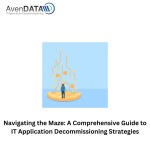In the rapidly evolving world of IT, the decommissioning of legacy systems like Oracle is becoming increasingly critical. As organizations shift towards modern technologies, the need to effectively retire outdated systems while preserving data integrity and ensuring compliance is paramount. Central to the success of Oracle decommissioning projects is the development and training of a skilled workforce. This blog explores the essential elements of training and development for Oracle decommissioning projects, highlighting the importance of a well-prepared team in achieving seamless transitions.
The Importance of Training in Oracle Decommissioning
Oracle decommissioning is a complex process involving multiple stages, from initial planning to final execution. It requires a deep understanding of both the legacy system and the new environment into which data and processes will be migrated. Proper training ensures that team members are equipped with the necessary knowledge and skills to manage this intricate process, minimizing risks and maximizing efficiency.
Key Training Areas for Oracle Decommissioning
Understanding Oracle Systems
Legacy Knowledge: Team members need a solid grasp of the Oracle systems being decommissioned, including their architecture, data structures, and operational nuances.
Data Migration Techniques
Data Integrity: Emphasizing methods to maintain data integrity throughout the migration process, including verification and validation techniques.
Compliance and Security
Regulatory Requirements: Training on relevant regulations and standards that must be adhered to during decommissioning, such as GDPR, HIPAA, and other industry-specific guidelines.
Project Management
Decommissioning Planning: Skills in project planning and management, including the creation of detailed decommissioning plans, timelines, and resource allocation.
Developing a Comprehensive Training Program
Assessment of Skill Gaps
Conduct a thorough assessment of the current skill levels of team members to identify areas that require additional training.
Customized Training Modules
Develop tailored training modules that address specific needs and skill gaps, ensuring relevance and applicability to the decommissioning project.
Hands-On Workshops
Incorporate practical workshops and hands-on training sessions to provide real-world experience and enhance problem-solving skills.
Collaboration and Knowledge Sharing
Foster collaboration and knowledge sharing among team members through regular meetings, forums, and collaborative tools.
Conclusion
Training and development are pivotal to the success of Oracle decommissioning projects. By investing in a comprehensive training program, organizations can equip their teams with the knowledge and skills needed to navigate the complexities of decommissioning with confidence. A well-trained workforce not only ensures a smooth transition from legacy systems but also positions the organization for future technological advancements and innovations. As the IT landscape continues to evolve, the importance of continuous learning and skill development cannot be overstated in maintaining a competitive edge and achieving long-term success.





.jpg)
Comments